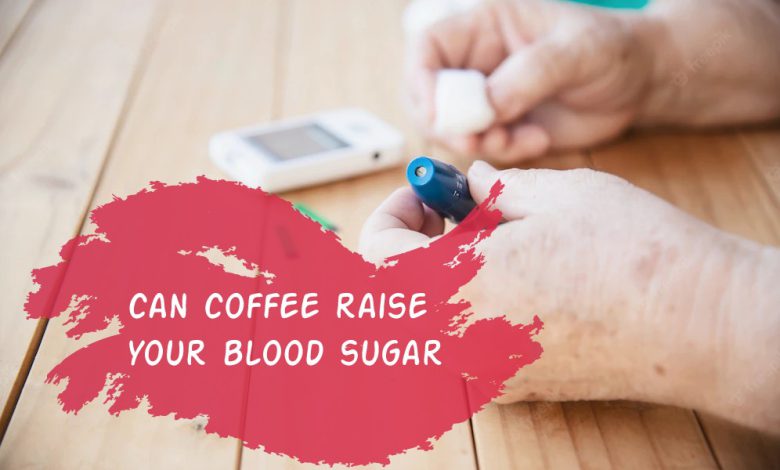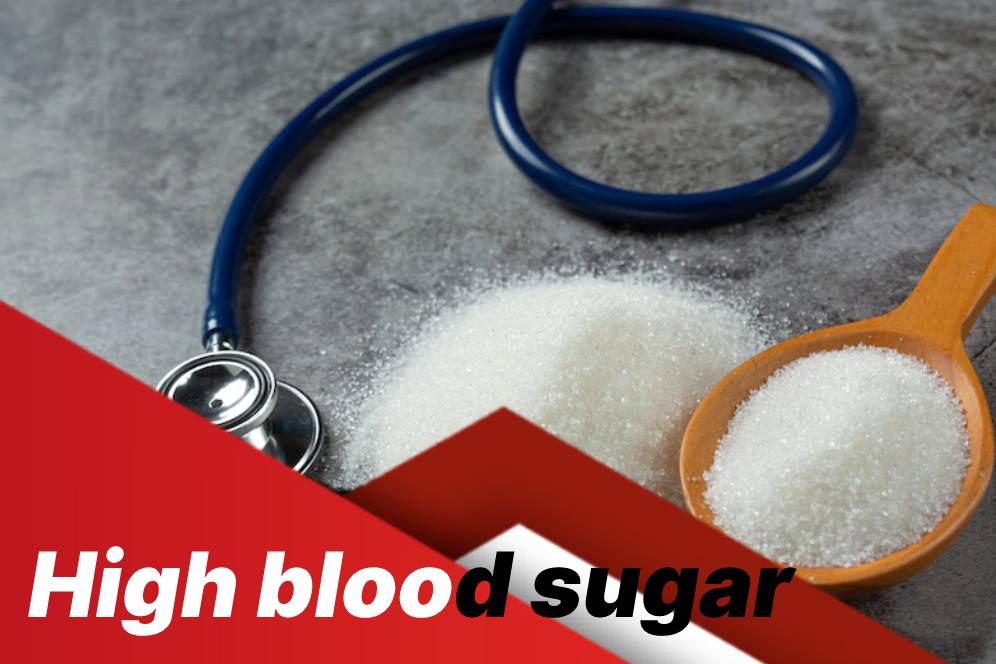Exploring the Effects of Caffeine in Coffee on Blood Sugar

According to what you are undoubtedly aware, drinking Coffee has become a habit for many individuals these days, and some people are even addicted to this beverage. They prefer consuming it during the day, whether they do it at a café or home with a cup of Coffee. Like any other foodstuff, this drink may have both benefits and negatives, and it can even be harmful to the body if drunk in excess.
One of the questions that individuals ask themselves when they consume Coffee is whether or not Coffee can raise their blood sugar? Because this problem is directly tied to physical health and has the potential to threaten the body, we chose to investigate it in further depth in this post.
If you are one of the many individuals who drink a lot of coffee and have been asked this question, you have come to the correct spot, and we encourage you to remain with us until the article’s conclusion.
Coffee for Diabetics, Good or Bad? Raises Blood Sugar or NOT? SugarMD.
Is coffee for diabetics good or bad? Does coffee affect blood sugar? Does coffee raise blood sugar?
Contents
- 1 High blood sugar
- 2 What’s the impact of Coffee on your blood sugar?
- 3 How does caffeine interact with high blood pressure?
- 4 Risks and warnings
- 5 What are the solutions?
- 6 instant coffee for diabetics
- 7 Can people with diabetes drink coffee?
- 8 Healthy alternatives to caffeine
- 9 FAQ
- 9.1 Does caffeine affect blood sugar?
- 9.2 How much does a cup of coffee raise blood sugar?
- 9.3 Does quitting coffee lead to lower blood sugar?
- 9.4 Does adding milk to coffee increase insulin?
- 9.5 does black coffee lower blood sugar?
- 9.6 is decaf coffee ok for diabetics?
- 9.7 can type 2 diabetics drink coffee?
- 9.8 is turkish coffee good for diabetics?
- 9.9 is espresso good for diabetics?
- 9.10 Takeaway
High blood sugar
Because of the industrialization of human life and the loss of natural human motions, the body is experiencing many issues these days: hyperglycemia (high blood sugar).
This condition occurs when the body does not produce enough insulin, resulting in an abnormally high average sugar level in the blood.
Vomiting, extreme appetite and thirst, a quick pulse, visual issues, and other signs are all possible side effects of diabetes-related hyperglycemia. Hyperglycemia, if left untreated, can result in significant health complications. Drinking Coffee, for example, can have a negative influence on the development of the illness, such as drinking Coffee. So, if you are one of the big coffee consumers and wonder how drinking Coffee will affect your life in the case of blood sugar, bear with us. Can Coffee affect blood sugar? Well, let’s see!
read more: Effects Of Drinking Coffee In Ms

In this article, you will read:
- What’s the impact of Coffee on your blood sugar?
- How does caffeine interact with high blood sugar?
- Risks and warnings
- What are the solutions?
- Takeaway
By the end of this article, you will have everything you need about your concerns related to Coffee and blood sugar.
What’s the impact of Coffee on your blood sugar?
After a short explanation in the preceding part, we can conclude that high blood sugar is one of the most prevalent issues we face today. Several meals may impact it, including coffee consumption. Let’s look at how it affects blood sugar levels in this part. Interestingly, Coffee can play both savior and destructive simultaneously in this specific situation, how you might ask?
If you are not suffering from blood sugar diseases, Coffee will not harm your blood sugar, meaning you can use it in your regular flow; in fact, it prevents your blood sugar from increasing to a level that you need artificial insulin. But, if you have high blood sugar, that’s ultimately a different story.
Interactions of your body with insulin and blood sugar are very likely to get impacted by Coffee, meaning it interrupts some of the critical interactions in your body and may cause your blood sugar levels to increase.

How does caffeine interact with high blood pressure?
Now that you can get the complete information about Coffee in the blood sugar let’s look at the effects of caffeine on it. Caffeine can affect how your body responds to insulin and the process of entering sugar into your body cells and turning them into energy.
The caffeine that is present in your Coffee can lower the sensitivity of insulin; after a heavy meal, your blood sugar rises, and with the interruption that caffeine causes in your insulin and cells, there is no limit to how much cells have to absorb sugar into the cell result being a high blood sugar disease.
Whit these much said, having this problem and still using Coffee may make it tougher to maintain your health.
Also, consuming too much Coffee when having high blood sugar causes your body to block the production of a protein called adenosine, which is responsible for setting how much insulin your body will make.
It takes only 200mg of caffeine to affect your blood sugar, and it’s equivalent to 2 cups of brewed Coffee.
Although people have different limits on using Coffee, some people get affected by 2 cups, and the others can get involved by 5, but this doesn’t mean that you have to test your limits. We suggest that you get tested for high cholesterol and blood sugar and then attempt to find your correct scale. Of course, there is a lot more in Coffee than only just caffeine that can cause something like this, but studies show that when subjects drink decaf coffee, their blood sugar levels are significantly lower than those who drink regular caffeinated coffee.
Still, we have to mention that decaf coffee contains a little bit of caffeine, so it’s not entirely caffeine-free but much lower. The impact of the sugar and fat in a lot of coffee and espresso drinks can outweigh the good from any protective effects of the Coffee.
Risks and warnings
Even for healthy people, the caffeine in Coffee can have some side effects and troubles.
These risks and side effects include:
- Increasing the cholesterol with unfiltered or espresso typed Coffee
- Increasing the chances of heartburn
- Elevated blood sugar levels after a meal
- Anxiety
- Headache
Ok, we understand the topic thoroughly. Now, what can we do?
What are the solutions?
So, what if someone is concerned about their blood sugar or even has high blood sugar and wants their Coffee fixed? We will offer you some alternatives and solutions so you can enjoy your coffee and not worry about anything else. First off, as we mentioned before, it is always an option to prefer decaf instead of normal caffeinated Coffee. Still, considering that even decaf coffee has a little bit of caffeine, you have to be careful and manage your coffee usage.
Second, if you’re not a deaf person, it’s ok. When ordering coffee at a café, ask for a unique coffee. Third, try your best to drink your coffee plaint and don’t add any sugar, syrup, cream, or additional sweetener.
Keep in mind that it’s not the right move to drink Coffee after a heavy or high glucose and sugar meal because, as we said, it’s going to disturb you. But if you are craving a change in flavor, you can use sugar-free varieties. You can even add vanilla or cinnamon to your Coffee as health flavors.
instant coffee for diabetics
Instant coffee is generally safe for diabetics to consume, as long as it is not sweetened. However, it is important to note that instant coffee is not as nutritious as regular brewed coffee, as it has fewer antioxidants and other beneficial compounds. Additionally, it is important for diabetics to be mindful of their caffeine intake, as too much caffeine can increase blood sugar levels.
Can people with diabetes drink coffee?
Yes, people with diabetes can consume coffee in moderation. The most important point is to synchronize coffee consumption with their blood glucose levels and avoid excessive coffee intake, which might lead to increased blood sugar levels.
Drinking coffee on an empty stomach can potentially increase blood sugar levels, so it’s advisable to consume something before having coffee or have it with a meal.
Healthy alternatives to caffeine
Healthy alternatives to caffeine can help you avoid the negative effects of excessive coffee and caffeine consumption. Below are a few healthy options for replacing caffeine:
- Green tea: Green tea has the least amount of caffeine compared to other beverages and also contains beneficial antioxidants.
- Herbal blends: Herbal drinks like mint, ginger, and saffron tea are caffeine-free options that can be used as healthy substitutes.
- Fruit-infused water: Consuming fruit-infused water can be a useful replacement for caffeine. Fruit-infused water keeps you hydrated and provides you with vitamins and other nutrients.
- Decaffeinated coffee: If you desire to have coffee, you can choose decaffeinated versions that have a negligible amount of caffeine.
- Natural beverages like water: Water is always the best option for hydration and reducing caffeine consumption.
It’s important to consult with a doctor or nutrition specialist before making changes to your diet to ensure that the chosen alternatives are suitable and compatible with your condition.
FAQ
Does caffeine affect blood sugar?
Consuming excessive amounts of caffeine for people with diabetes can create issues. Caffeine can have an impact on blood sugar and lead to increased blood sugar levels in individuals with diabetes. Additionally, caffeine might alter metabolic effects and affect insulin function.
How much does a cup of coffee raise blood sugar?
A cup of coffee can temporarily elevate blood sugar levels. The extent of this effect can vary based on the amount of coffee consumed, the type of coffee, and the individual’s condition. However, individuals with diabetes should pay attention to moderate coffee consumption to prevent negative effects on blood sugar control.
Does quitting coffee lead to lower blood sugar?
Yes, quitting coffee can help lower blood sugar. Continuous and excessive coffee consumption can contribute to increased blood sugar levels. By quitting or reducing coffee intake, insulin sensitivity might improve, and blood sugar control can be enhanced.
Does adding milk to coffee increase insulin?
Yes, adding milk to coffee can potentially increase insulin levels. Milk contains lactose, which can enhance insulin effects.
does black coffee lower blood sugar?
Yes, black coffee can help lower blood sugar levels. Studies have shown that coffee can help reduce the risk of type 2 diabetes and can improve insulin sensitivity. Additionally, coffee can help reduce inflammation and oxidative stress, which are both associated with diabetes.
is decaf coffee ok for diabetics?
Yes, decaf coffee is generally safe for people with diabetes. However, it is important to note that decaf coffee still contains some caffeine, so it is best to limit your intake to no more than 2 cups per day. Additionally, it is important to watch your sugar intake when drinking decaf coffee, as some brands may add sugar or other sweeteners to their products.
can type 2 diabetics drink coffee?
Yes, type 2 diabetics can drink coffee in moderation. However, it is important to note that coffee can affect blood sugar levels, so it is important to monitor your blood sugar levels closely when drinking coffee. Additionally, it is best to avoid adding sugar or cream to coffee, as these can add extra calories and carbohydrates.
is turkish coffee good for diabetics?
No, Turkish coffee is not recommended for diabetics. It is high in sugar and caffeine, which can affect blood sugar levels. Additionally, the unfiltered grounds can cause digestive problems for those with diabetes.
is espresso good for diabetics?
Yes, espresso is generally considered safe for diabetics. However, it is important to note that espresso can contain high amounts of caffeine and sugar, which can be problematic for people with diabetes. It is best to limit the amount of espresso consumed and to avoid adding sugar or other sweeteners.
Takeaway
In conclusion, most drinks and foods have high levels of sugar or will affect your blood sugar levels, and the bottom line is if you use them correctly, it’s ok.
For you coffee lovers that are worried about your health and, to be specific, your blood sugar and cholesterol,
We say that if you read this article top to bottom and use the tricks and solutions that we offer, you have nothing to worry about, and therefore, you can enjoy your Coffee.
We hope this article answers every question you had about Coffee and its relation to your blood sugar, but if there is a topic or concern that we didn’t cover, ask us in the comment section, and we will gladly answer all of your questions.




